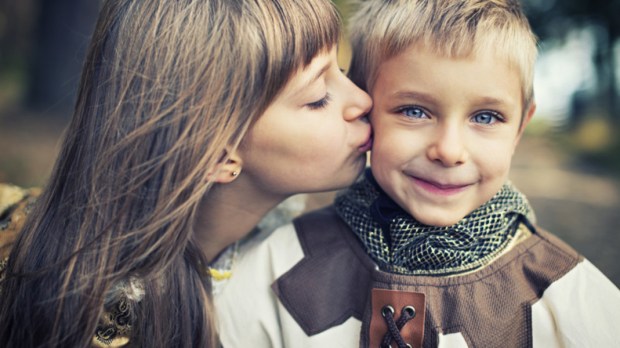One night I arrived home with my 8-year-old son — our arms full of groceries — when he opened the door with his chin and proclaimed “ladies first.” As I walked in front of him I wanted to gobble him up then and there. He was giving me a glimpse of the man I’m hoping he’ll turn out to be, and I couldn’t have been happier.
It was one of those beautiful — albeit rare — parenting moments where you feel you’ve accomplished something … on some level, your kids have really listened to you, and it fills your heart with joy.
Sadly, in my case, this euphoric mom-moment lasted all of two minutes. A flash of a memory brought me crashing back down to earth: I remembered a recent cringe-worthy moment when my tired 10-year-old complained loudly about getting up for an elderly lady on the subway after basketball practice.
Manners do maketh man
There is still some work to be done, I thought. To use an old fashioned quote: “manners maketh man,” and as a mom, I feel I have a huge responsibility in helping to make that man.
But I’d also like to go further. I want my mini-men to become the perfect gentlemen, which is a very important distinction. It’s the difference between Bruce Willis in Die Hard and Sean Connery as James Bond— obviously without the womanizing … and the killing. I know which one I’d be more attracted to!
It might seem a bit old school in a modern society where we constantly fight for equality between the sexes, but I wouldn’t feel weak or any less equal if a man offered me his seat; instead I’d feel touched by a considerate action and physically relieved. (With age, my hips seem to be getting wider so my heels are getting higher, and schlepping around the city all day is no easy feat.) Giving up a seat for a woman, or for someone in need, is a generous gesture that I’d like my sons to make for me, so why shouldn’t they do it for others? I’m trying to teach them to think about what I might appreciate, and because they’re not quite teens, I’m hoping that they’ll care.
The reason I’m also insistent on instilling a thoughtful level of manners in my sons is that I admire what true chivalry represents. Although it originates from medieval times, according to the site Chivalry Now, by adhering to this code of conduct “men are called to be truthful, loyal, courteous to others, helpmates to women, supporters of justice, and defenders of the weak. They are also expected to avoid scandal.” What’s not to love? Where do my boys sign up?
Chivalry today
Adhering to this code allows chivalry to play a very charming role between men and women, almost acting as a dating aid. It helps in creating initial contact between two people, normally involving eye contact, and often a smile — a real ice-breaker and enough to make a girl’s heart flutter. However, I’m aware that we are in the 21st century. I’m not expecting a knight in shining armor to lay his cloak over a puddle as I gingerly step over it in my Jimmy Choos (we shouldn’t leave clothes lying on the floor, first of all, and more importantly cloaks are not exactly the modern man’s go-to piece of outerwear).
But there are the old classics that I really do appreciate, such as date-night when my husband opens the car door for me, not because I’m unable, but because it gives me a few extra seconds to wipe the lipstick off my teeth. One of my all-time favorites is having my husband give me his coat when he sees I’m totally under-dressed—as usual—when we’re leaving a restaurant late at night. And the modern act of chivalry: if there’s only one cell-phone charger, my phone seems to take priority. It is these simple thoughtful gestures that turn my husband into my very own Prince Charming.
Unfortunately nowadays men find it harder to be chivalrous in fear of negative backlash, yet it is an under-rated skill, and one to nurture. For chivalry to truly be awakened we need, as parents, to teach and encourage this gallantry.
I’m also hoping that other random Sir Lancelots or Mr. Darcys we might encounter in the street will show the way to being the perfect gentleman. And in return, I’m teaching my daughter to accept any chivalrous deeds gracefully for the acts of kindness they are.



